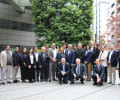Q&A with Dorothy Chou at the 2016 FIA Mobility Conference

Q You’re here to talk about the impact of the collaborative economy from your perspective as a Policy Adviser at Uber. For you what does the phrase ‘sharing economy’ mean?
A It’s basically the ability to share resources. Today I spoke a little about how 96% of cars are just not being used at any given time, so I think there has to be more thinking about how we can use those shared resources. They are resources that are very expensive, so we can find ways to share the cost by being able to share rides through products like UberPool which allows people who are going in the same direction to share the cost of the ride. It can help reduce congestion, has environmental benefits and can even change the way we use our cities. It will really start to change the future of mobility.
Q Is the peer-to-peer business model here to stay, or is there a risk that increased regulation will encroach into the space occupied by companies such as Uber?
A We’re really optimistic about the future of ride sharing and we think that we will be able to work together with governments and organisations to craft regulations that make sense for these environments. Consumers need to be able to have confidence in the model, so regulations need to ensure they can have a safe and reliable ride at all times, it needs to be innovation friendly and technology neutral.
Q What are the lessons to be learned from the arrival of platforms such as Uber and AirBnB for traditional motoring organisations? Is it that aggregation of services into a single, user-friendly space is the future?
A It’s interesting, the FIA President was talking today about how it’s not necessarily the future of car rides, but it is the future of mobility and that’s the right way to think about it. He was encouraging people in the Clubs to think about the future, and Mobility as a Service is something on the rise, so I’m excited to see that and the FIA is going to be an important part of that future.
Q Is there another lesson for more established business – that unless you embrace new technology and innovate you will be left behind?
A I think it’s important for new technologies to complement existing services, if you look at the way our service works for example, a lot of people take an Uber for the last miles to and from public transit. So that means that public transit is not only still important, it’s actually more important than ever as more people have access to it. New models need new regulation that can allow for innovation to happen while they also complement old models.
Q There’s a statistic out there that suggests Uber is entering a new market every six days. That’s a staggering level of growth. How is that manageable in terms of reliability, availability and most importantly safety?
A We have to be ensuring safety before, during and after every ride. That means improving transparencyand accountability of what happens when you get into a car – we allow users to see the exact make, model, licence plate and driver of every car, and every ride is GPS tracked from beginning to end. The ability to provide real-time feedback and ratings, and to assess that data to see who should and shouldn’t be on the road all adds up to a lot of safety in the service.

 Facebook
Facebook Twitter
Twitter






